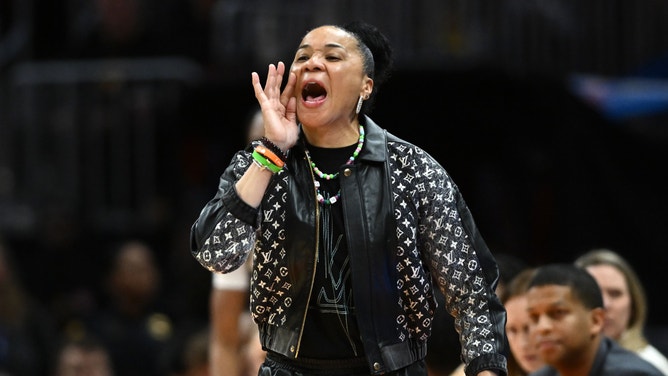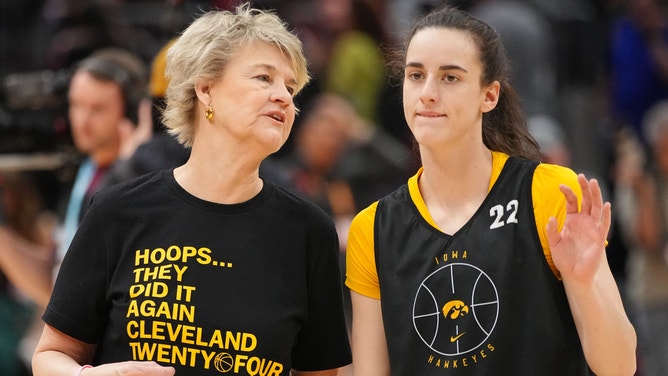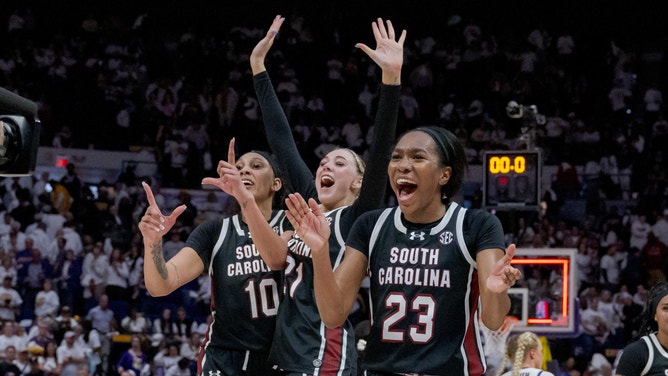Iowa-South Carolina 'Bar Fight' Rematch Pits Caitlin Clark Against The Sport's Best Team
CLEVELAND – "We're not bar fighters. We're not thugs. We're not monkeys. We're not street fighters." Those were the words of South Carolina Gamecocks head coach Dawn Staley after losing to Caitlin Clark and the Iowa Hawkeyes in last year's Final Four.
Staley had taken umbrage with pre-game comments from Iowa head coach Lisa Bluder, as well as some media members, for the way they described her team.

South Carolina Gamecocks head coach Dawn Staley reacts against the NC State Wolfpack during the Final Four of the Women's 2024 NCAA Tournament.
(Ken Blaze/USA TODAY Sports)
Bluder was asked, before that Final Four matchup against South Carolina, how her team planned to handle the Gamecocks' larger lineup. The Hawkeyes head coach responded by saying rebounding against South Carolina was like "going to a bar fight." She later said she meant nothing negative by the comments. That makes sense – people have been describing sports in manners such as that for a long time.
Bluder even suggested that Staley used that comment to try and motivate her team, something that she does herself.

Iowa Hawkeyes head coach Lisa Bluder and star player Caitlin Clark prepare to face the South Carolina Gamecocks in the NCAA Women's Basketball National Championship on Sunday.
(USA Today Sports)
Well, one year later, these two teams meet again, this time with a National Championship on the line. This is a different South Carolina team than last year. Staley chose to go with a smaller team of mostly guards this season, flanking her star interior player, 6'7" Brazilian-born Kamilla Cardoso.
Perhaps that was in response to losing to the guard-heavy Hawkeyes who are led by the nation's best player, Caitlin Clark. There's no player outside of Cardoso in the Gamecocks starting lineup that stands taller than 6'2". That strategy has worked perfectly for Staley, whose South Carolina team has not lost a game this season.
It's also naive to ignore the racial undertones at play on Sunday. Like LSU, South Carolina features a roster of mostly non-white players. That's in stark contrast to the Hawkeyes, a team of mostly white players. Staley's comments at last year's tournament about her team not being "thugs" or "monkeys" were a clear reference to the racial dynamics at play.

South Carolina Gamecocks players Kamilla Cardoso, Chloe Kitts, and Bree Hall celebrate a victory.
(Matthew Hinton/USA TODAY Sports)
There's been a lot of discussion about Caitlin Clark, a white player, dominating a sport comprising mostly non-white players. Yes, that does help her appeal. But it's not because Americans just simply love white players; that's a myth created by a certain section of the media.
READ: Paul Pierce Can't Believe 'Little White Girl' Caitlin Clark Can Compete With Black Women
What people find fascinating is when someone out-of-the-ordinary breaks through. Perhaps the best example of this is Tiger Woods. America fell in love with Tiger Woods, not just because he is the greatest golfer of all-time, but because he is a black man who dominated a sport traditionally dominated by white players. That was part of his story.
Caitlin Clark's white skin is part of her story, like it or not. But that's not the whole story. Clark is a generational talent, and she exudes the attributes of other great athletes, like Woods or, to bring it back to basketball, Michael Jordan or Kobe Bryant. On the court, she's a dynamo. She shoots better than anyone, and she has court vision that is unrivaled. Watch her break down, nearly second-by-second, one of the most important offensive possessions of the team's win over UConn on Friday night.
That's some next-level stuff that we often see from the greats of their sport. After her basketball playing career ends, Clark likely won't have any shortage of opportunities to do whatever she wants. Coaching seems like a great path for her, though.
But that's a discussion for another time. For now, the conversation is clear. Coming off the most-watched women's basketball of all-time, Sunday's National Championship figures to break that record for the third-straight Iowa game.
On one side, you have Dawn Staley and her undefeated South Carolina Gamecocks. Staley herself is one of the most powerful figures in women's sports. On the other is Caitlin Clark, the best women's college basketball player of all-time.
Buckle up for a battle on Sunday afternoon in Cleveland. Just don't call it a "bar fight."